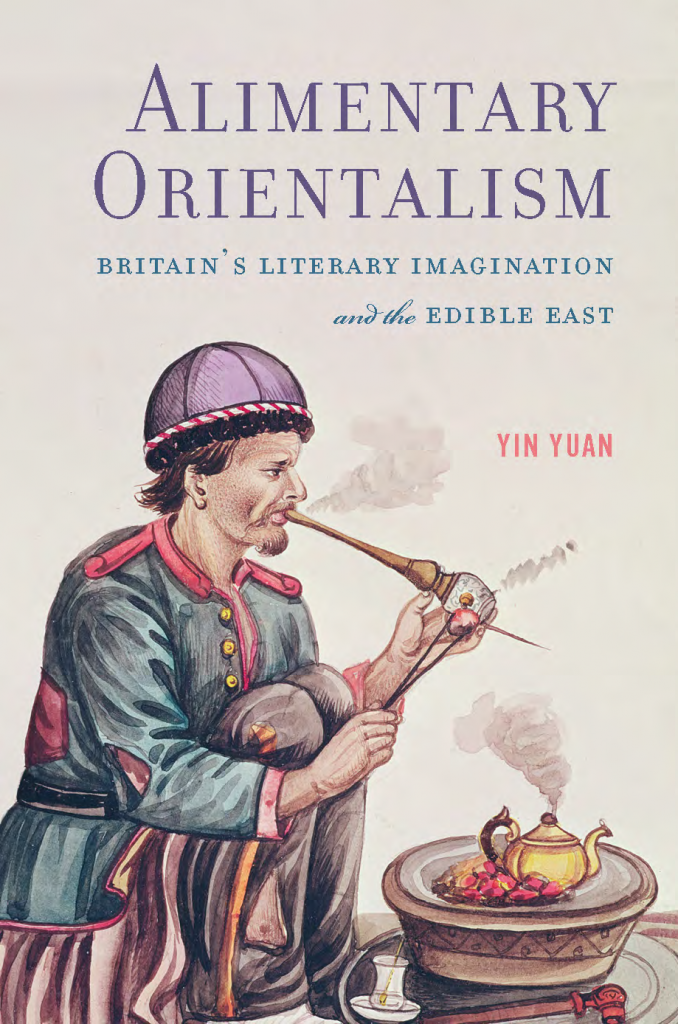
The most recent title in Bucknell University Press’s landmark Transits series, Alimentary Orientalism: Britian’s Literary Imagination and the Edible East, traces exotic ingestion as a motif across a range of eighteenth- and nineteenth-century texts, considering how, why, and whither writers used scenes of eating, drinking, and smoking to diagnose and interrogate their own constructions of the Orient. In the excerpt below, author Yin Yuan, assistant professor of English at St. Mary’s College of California, discusses the role of consumption in Oliver Goldsmith’s The Citizen of the World.
Chapter 2 | “Eating Only What I Knew”: Exotic Consumerism and the Boundaries of Selfhood in The Citizen of the World and Vathek
Through the character of Lien Chi, Goldsmith thus reflects upon the relationship between Britain’s consumption of exotic texts and its consumption of exotic things. The parallel between the two exposes the figurative structure of exotic consumerism—that is, its discursive, Eurocentric logic, contrary to the promise of materiality it bears. It is within the context of Goldsmith’s negotiation between figurativeness and materiality that we can understand the curious obsession with eating running throughout The Citizen of the World, an obsession thus far over- looked by the critical literature.
In “Letter XIV,” Lien Chi’s English host experiences a strangely “violent passion to see him eat”: “You that attend there, bring up a plate of beef cut into small pieces; I have a violent passion to see him eat. Pray, Sir, have you got your chop-sticks about you? it will be so pretty to see the meat carried to the mouth with a jerk” (64). This passage comes immediately after the discursive surgery that Lien Chi received. Having previously “cut” Lien Chi up, the lady now seeks to endow her own idea of his “outlandish cut” and “exotic breadth” with material form, which she can then manipulate (“jerk”) to suit her fancy. This she tries to achieve by persuading Lien Chi to eat “a plate of beef cut into small pieces” (emphasis added). The act of ingestion, which transgresses the contours of body through the introduction of alien matter, attains the force of a Derridean boundary logic: the border between inside and outside, which safeguards the integrity of the self, is here conjured up and reinforced precisely through the threat of its being breached.1 To “see [Lien Chi] eat” is thus to witness the production of a distinct bodily form, which the lady seeks as a way of materially realizing her idea of Chineseness.
If Britain’s exotic ingestion concretizes its fantasized access to cultural otherness, in “Letter XIV” Goldsmith invokes the symbolic power of such eating only to stage its double failure: the English host does not eat, nor does the Chinese gentleman. The letter ends by noting that Lien Chi “took leave just as the servant was bringing in a plate of beef, pursuant to the directions of his mistress” (65). While the lady displays a love for chinoiserie that rivals, in its excessiveness, the ravenous wife’s desire for “as much China as would have furnished an India Shop,” Goldsmith’s letter refuses the grotesque trajectory of taste recorded in The Spectator.2 Rather, the joke turns not so much on the ludicrousness of the lady’s appetite as on the ludicrousness of her appetite for seeing another eat. The letter traffics in the possibility of ingestion without ever fulfilling it. The mediated nature of eating stages the failure of producing and thereby vindicating a particular idea of alterity through “see[ing] [the other] eat”—thus underscoring the illusive nature of the Chineseness that the lady consumes. Her collection of Chinese things weaves her own solipsistic, discursive fantasies, interrupting any potential encounter with the cultural other. She remains trapped within a Eurocentric regime of signs that mocks rather than masters the historical referent that is China.
Yin Yuan is an assistant professor of English at Saint Mary’s College of California in Moraga. Her research interests include British Orientalism, Anglophone literature, and East Asian popular culture and her work has been published in Studies in Romanticism, Keats-Shelley Journal, and SEL: Studies in English Literature 1500-1900.

- This idea recurs throughout Jacques Derrida’s writings. For his formulation of this problem specifically within the context of the pharmakon, an ingestible poison or cure, see Jacques Derrida, Of Grammatology, trans. Gayatri Chakravorty Spivak (Baltimore, MD: Johns Hopkins University Press, 1976), 110.
- [Richard Steele], “No. 326,” in The Spectator, ed. Donald F. Bond (Oxford: Clarendon Press of Oxford University Press, 1965), 3:196. See my reading of this item in chapter 1.